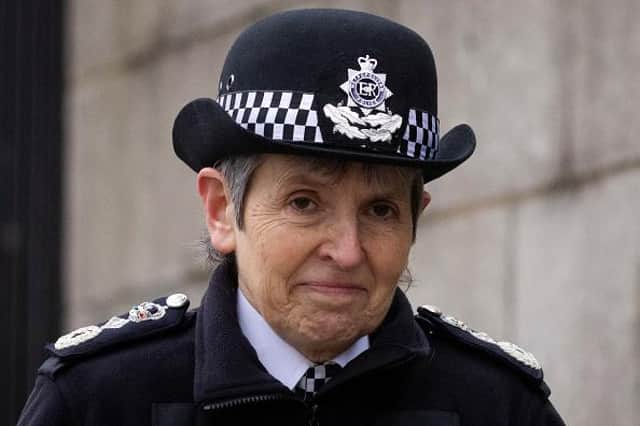A fresh start is needed, a rooting out of all the liars, a deep-clean of a toxic culture - Dani Garavelli


As late as Thursday morning, she was still declaring her intention to stay put. And when - hours later - she finally backtracked, she blamed the Mayor of London, Sadiq Khan, for his loss of confidence rather than herself for having squandered it.
There was no epiphany for the soon-to-be-ex-Commissioner. Nor for any of those public figures whose conduct has recently been called into question. Dick’s response to the successive scandals has been to treat them as if they were freak, unforeseeable occurrences rather than a direct consequence of her failure of leadership. She has expressed more concern over the damage done to the reputation of her force than to the victims of her officers’ lack of professionalism.
Advertisement
Hide AdAdvertisement
Hide AdThese days, it’s not the wrongdoing itself but the public backlash that brings forth expressions of remorse. So Boris Johnson' s regret was not that he went to a party, which was “technically within the rules”, but the response of the millions of people who didn’t see it that way. Just as Raith Rovers manager John McGlynn's regret was less that his club signed rapist David Goodwillie and more that it failed to anticipate “the depth of feeling” that signing would unleash.
Perhaps it was this inability to accept responsibility that convinced Khan the Commissioner’s position had become untenable. Or the revelation one of the Charing Cross station officers who sent grossly offensive messages had later been promoted. Or the fact Dick’s answer to regaining public confidence was to write an email demanding the identification of “toxic and unhealthy teams and bullies”. A call for zero tolerance of discrimination by a woman who reduced systemic bigotry to "a few bad apples” was never going to be taken seriously.
Whatever pushed Khan over the edge, Dick’s exit was long overdue. Some compared it to Allegra Stratton’s resignation in the wake of the initial party allegations. Others pointed out Dick hadn’t broken the law while Johnson almost certainly has. But these pleas in mitigation are red herrings. Unlike Stratton, Dick hasn’t been used as a fall-guy for someone more culpable. And, while Dick did not break the law, her force appears to have ignored others doing so. In any case, you don’t have to break the law for your actions to have deadly consequences.
The danger is Dick's departure will be seen as a solution in itself, rather than the first step in a rigorous clear-out. That danger is amplified by the politics surrounding her resignation - a situation the Labour mayor inflamed by failing to forewarn Home Secretary Priti Patel.
While there were tensions between Dick and Patel, she had not demanded her resignation: a position that may or may not be connected to the Met’s investigation into the Downing Street parties on which the Prime Minister’s future hangs.
The force’s failure to crack down on those events - along with Dick’s general chumminess - must have given Johnson cause for optimism. But whoever takes over will come into the role with something to prove. Still smarting over the hypocrisy - the way those in power thought they were above the law - the public will no doubt scour the investigation’s findings for fresh evidence of double standards. To have any credibility, the new Commissioner will need to establish his or her independence.
This is doubly true after a “senior ally” of Johnson suggested the force would have to be “very certain” he had breached lockdown rules before issuing a Fixed Penalty Notice. “There is inevitably a degree of discretion here. Do we want the Met Police deciding who is the next Prime Minister?” the ally continued ominously. The statement is nonsensical. If a finding against the Prime Minister could be viewed as political, so too could a finding in his favour. But it has intimidatory overtones incompatible with democracy.
For these reasons, it would be better if Dick’s successor came from outside the Met, or, at the very least, from outside Balliol College. If it has to be an internal promotion, then assistant commissioner Neil Basu might be a good shout. Basu once irked Johnson by claiming his history of racist comments would rule him out of joining the police. Patel has insisted she - not Khan - will be making the appointment. A shrewd Home Secretary would see the wisdom in going for an outsider. She would understand the need to demonstrate a willingness to reform. But Patel is not shrewd, and the clever money is on her picking whichever candidate she perceives as most biddable.
Advertisement
Hide AdAdvertisement
Hide AdIf anything is to change, Dick’s successor will need to be tough, too. In the wake of Sarah Everard's murder, Baroness Casey of Blackstock is conducting a review of culture and standards. Given what we already know, her report is likely to be damning. It will require more than a stroppy email to fix it.
What is true of the Met is also true of the government. A few weeks ago, David Davis claimed: “Boris will not leave No 10 unless he is dragged out kicking and screaming”. With any luck, that day is near at hand. But good though it will be to see him go, his departure will only prove significant if it is the start of something bigger: a fresh start; a rooting out of all the liars; a deep-clean of a toxic culture. I’m not holding my breath.
